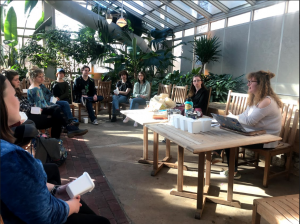
Cassie Glase
Contributor
[email protected]
Moriah Martin sets out a little more than a dozen plastic containers on a table in the Glass House. As an eco-rep coordinator for the Student Environmental Center (SEC), she prepares to lead students on a week long zero waste challenge. For one week, those participating must contain all their waste within a 20 oz. plastic bin.
Martin provides participants with guidelines and tips for living as waste free as possible. Advice such as where to buy packaging-free food and how to cut down on single-use plastics is distributed along with the bins.
“Any reductions in plastic use and less waste is a stride in the right direction,” Martin said. “Little things really do add up and make an impact.”
The challenge is in good fun to see how eco-friendly students can be, but it’s a challenge for a reason. Living sustainably gained a lot of traction in recent years although it is no simple task. It can take time, energy and resourcefulness to practice.
The SEC recognizes living sustainably and being a student isn’t always an easy balance to strike. Through initiatives like a residence hall composting program, they aim to make being environmentally-conscious feasible for the average student.
“Because we’re a student run department, we understand the situation of students living on and off campus more than maybe one that’s run by pro-staff members,” SEC Co-Director Julia Dorn said. “I think that we have that advantage, being able to deliver programming and resources that students want because we know as students what we want.”
Individual students aren’t the only ones who may face barriers with sustainability. Student organizations have a unique set of environmental challenges when they plan events. When dealing with resources such as large amounts of food and disposable products, there is the potential for a lot of waste.
Nikolai Wise, the programming supervisor of student relations in Highsmith Student Union, said that organizations may not be aware of the sustainable options available to them.
“That isn’t to say that they aren’t necessarily posted, it’s just that a lot of organizations need that nudge,” Wise said.
Wise also said the cost of sustainable products may be a deterring factor for some student organizations. However, there are programs that help organizations achieve their sustainability goals.
“The Student Environmental Center has something called the ‘Green Grant’ program. They will provide funding for you to make your events more sustainable,” Wise said. “So if you’re like ‘Alright, we’re giving food from Chartwells,’ you can ask for a certain amount of money and they’ll help pay for you to have compostable materials at your event.”
The cost factor of sustainability is also an important consideration for the average student. While the upfront cost of buying reusable products may be a little more expensive, Martin said it’s a worthwhile investment.
“Most of the time it’s more pricey than buying like a throwaway Ziploc container or aluminum foil, but if you think about it, that product is probably going to last at least a year, maybe two or three depending how often you’re using it,” Martin said.
The week long zero waste challenge came to a close on Monday, April 8 when participants had to turn in their bins for the official weigh in. Student Carlen Ferrelli won by amassing only 30 grams of landfill waste over the seven days.
While the environment will certainly thank Ferrelli for her sustainability efforts, any attempt at waste reduction is better than none. Things like incorporating reusable grocery bags and coffee cups into daily routines are a great way to get into a sustainable mindset.
For Dorn, the sustainable mindset extends beyond the traditional practices.
“It always comes down to remembering that you’re a person first and taking care of yourself. If you’re not living sustainably, as in being able to continue on effectively, then you’re not going to be an effective student,” Dorn said. “Self care I see as a part of sustainability. That includes being outside, healthy diets, connecting with nature and those types of things are important to just being a human being. I feel that it’s the most sustainable thing to do as a human being to take care of yourself, to take care of the planet, so that you can be a more effective student, worker and family member.”

















